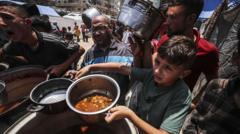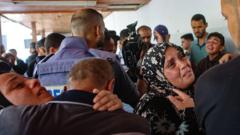The World Health Organization describes the situation in Gaza hospitals as "beyond description" due to continuous strikes, crippling medical supplies, and rising casualties.
**Gaza Hospitals Face Unprecedented Crisis Amid Ongoing Conflict, WHO Reports**

**Gaza Hospitals Face Unprecedented Crisis Amid Ongoing Conflict, WHO Reports**
Conditions in medical facilities deteriorate sharply as Israeli strikes escalate.
The World Health Organization (WHO) has urgently reported that conditions in Gaza's hospitals are now "beyond description." This grim assessment follows a devastating Israeli air strike that rendered al-Ahli Hospital in Gaza City non-operational. Dr. Margaret Harris, WHO spokeswoman, highlighted the increasing frequency of attacks on hospitals and healthcare personnel, exacerbated by critical shortages of medical supplies resulting from Israel's blockade of the region.
On Sunday, al-Ahli hospital was struck, destroying its laboratory and damaging the emergency room. Hospital staff indicated that while there were no immediate casualties from the strike, disruption in care led to the death of a child. The Israeli military defended the attack by stating it targeted a "command-and-control center" used by Hamas for planning assaults.
The hospital, affiliated with the Church of England, was bombed for the fifth time since the conflict reignited four weeks ago. An Anglican Diocese representative noted that the strike demolished the laboratory and pharmacy, severely hindering medical services. While the Israeli military asserted that they provided a 20-minute warning for evacuation, the Church of England's bishops condemned indiscriminate attacks on healthcare facilities and called for an impartial investigation into the incident.
The WHO's Director-General, Dr. Tedros Adhanom Ghebreyesus, confirmed that critical hospital equipment, including X-ray machines and the emergency room, had been destroyed, forcing the transfer of 50 patients to other facilities, with 40 critically ill patients remaining stranded. Medical services are alarmingly compromised, making it impossible for the hospital to accept new patients.
Dr. Rik Peeperkorn of the WHO expressed concerns over dwindling medical supplies, with vital humanitarian aid being blocked from entering Gaza for over six weeks. Meanwhile, medical professionals at al-Ahli Hospital described the situation as dire, comparing their current capacity to that of a hostel.
Adrian Zimmermann, from the International Committee of the Red Cross, echoed these concerns over the risk to Gazans seeking medical care. As the situation escalates, medical staff are forced to reuse surgical supplies, significantly endangering the health of patients.
Amid ongoing tensions, Israel's military campaign against Hamas continues in response to a violent cross-border attack on October 7, which resulted in the deaths of around 1,200 individuals and the hostage-taking of 251 others. The Israeli government has faced criticism for not facilitating the movement of humanitarian aid and supplies while seeking resolution on hostage negotiations with Hamas.
As efforts for a lasting ceasefire remain stalled, the humanitarian crisis in Gaza’s healthcare system deepens, worsening the plight of a population already enduring immense suffering. The need for immediate international attention on this critical situation grows ever more urgent.
On Sunday, al-Ahli hospital was struck, destroying its laboratory and damaging the emergency room. Hospital staff indicated that while there were no immediate casualties from the strike, disruption in care led to the death of a child. The Israeli military defended the attack by stating it targeted a "command-and-control center" used by Hamas for planning assaults.
The hospital, affiliated with the Church of England, was bombed for the fifth time since the conflict reignited four weeks ago. An Anglican Diocese representative noted that the strike demolished the laboratory and pharmacy, severely hindering medical services. While the Israeli military asserted that they provided a 20-minute warning for evacuation, the Church of England's bishops condemned indiscriminate attacks on healthcare facilities and called for an impartial investigation into the incident.
The WHO's Director-General, Dr. Tedros Adhanom Ghebreyesus, confirmed that critical hospital equipment, including X-ray machines and the emergency room, had been destroyed, forcing the transfer of 50 patients to other facilities, with 40 critically ill patients remaining stranded. Medical services are alarmingly compromised, making it impossible for the hospital to accept new patients.
Dr. Rik Peeperkorn of the WHO expressed concerns over dwindling medical supplies, with vital humanitarian aid being blocked from entering Gaza for over six weeks. Meanwhile, medical professionals at al-Ahli Hospital described the situation as dire, comparing their current capacity to that of a hostel.
Adrian Zimmermann, from the International Committee of the Red Cross, echoed these concerns over the risk to Gazans seeking medical care. As the situation escalates, medical staff are forced to reuse surgical supplies, significantly endangering the health of patients.
Amid ongoing tensions, Israel's military campaign against Hamas continues in response to a violent cross-border attack on October 7, which resulted in the deaths of around 1,200 individuals and the hostage-taking of 251 others. The Israeli government has faced criticism for not facilitating the movement of humanitarian aid and supplies while seeking resolution on hostage negotiations with Hamas.
As efforts for a lasting ceasefire remain stalled, the humanitarian crisis in Gaza’s healthcare system deepens, worsening the plight of a population already enduring immense suffering. The need for immediate international attention on this critical situation grows ever more urgent.





















